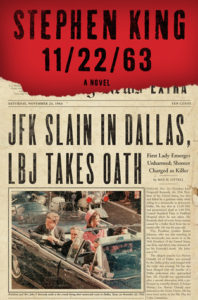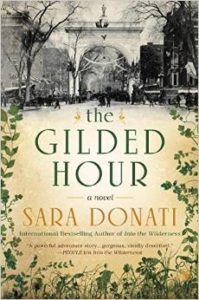 11/22/63 by Stephen King
11/22/63 by Stephen King
Recommended
Jake Epping is a 35-year-old high school English teacher in the small town of Lisbon Falls, Maine. To earn some extra money, he also teaches English to adult GED students. The only other activity in his life is moping around and lamenting the recent divorce from his short-term alcoholic wife. At least he doesn’t have to track her down and go drag her home from some bar any more.
So when Al Templeton, owner of the local diner, asks Jake if he’s willing to take on a secret mission, Jake’s interest is piqued. Al confides to Jake that, at the rear of the diner, there’s a portal that leads to a day in 1958. Al himself has gone through the portal and back several times, so he knows that the passage through always leads to the same day. Also, no matter how long he has stayed in the past, when he returns he has always been gone from the present (2011) for exactly two minutes.
Al believes that the greatest disaster of modern history was the assassination of U.S. President John F. Kennedy. When he discovered the time portal, he decided to go back in time and prevent Lee Harvey Oswald from shooting JFK. Al has spent years researching Oswald’s life and movements, but now he’s dying of lung cancer and can’t finish the job. Would Jake be willing to see the mission through?
After a few trial runs into the past and back, Jake agrees. Armed with Al’s notebook of information on Oswald, he goes back to 1958 with the plan of ending up in Dallas on 11/22/63. He drives through the land of Long Ago and settles down in a small town in Texas to make his preparations. There he becomes George Amberson, who begins substitute teaching at the local high school, falls in love with the new school librarian, and finds a life much more satisfying than the one Jake Epping left behind in Lisbon Falls.
Will George/Jake be able to stop Lee Harvey Oswald from killing JFK? And, if he succeeds, how will subsequent history unfold?
Stephen King excels at using details to create interesting characters and to build narrative worlds. 11/22/63 presents him at his storytelling best.
The Gilded Hour by Sara Donati
 It took me a while to figure out the provenance of this book.
It took me a while to figure out the provenance of this book.
First, Sara Donati is a pen name for Rosina Lippi, a former university professor. She writes historical fiction as Sara Donati. Under her own name she writes contemporary novels and academic work.
Second, the blurb on the inside fold of the dust jacket says “The Gilded Hour follows the story of the descendants of the characters from the Wilderness series.” I, apparently erroneously, took this to mean that this novel is the next installment of that series. According to Lippi’s web site, the Wilderness series comprises “six historical novels that follow the fortunes of the Bonner family in the vast forests in upstate New York, from about 1792–1825.” However, The Gilded Hour, also about the Bonner family, jumps forward to after the Civil War. It is the first book in a new series that will follow the Bonner granddaughters into the twentieth century.
For more information, see these sources:
![]()
In New York City in 1883, two female physicians, Anna Savard and her cousin Sophie Savard, graduates of the Woman’s Medical School, care for the city’s poor and immigrant inhabitants. They must contend not only with society’s expectations for women, which still looked down upon women in professions previously reserved for men, but also with Anthony Comstock, self-proclaimed upholder of Victorian morality and creator of the New York Society for the Suppression of Vice. The 1873 Comstock Law, passed by the U.S. Congress, made illegal the production and distribution of any printed material explaining abortion or birth control. For more information about Anthony Comstock, see THE LIFE AND TIMES OF A TRUE AMERICAN MORAL HYSTERIC.
I was drawn to this novel because I wrote my dissertation on the life stories of five nineteenth-century U.S. women physicians. The first woman to receive a medical degree in the U.S. was Elizabeth Blackwell, in 1849. Women of that era knew that they had to be self-confident, assertive, and thick-skinned to succeed, but they also knew that they could not overtly flout society’s expectations about the proper behavior of women. Most early women physicians therefore worked to expand the role of women to include health care rather than to denounce social expectations altogether.
And this is where I become uncomfortable with Sara Donati’s portrayal of Dr. Anna Savard, who quickly becomes the central focus of the novel when her cousin Sophie departs for Switzerland. Anna is self-confident, assertive, and thick-skinned, but too aggressively so. She is always eager for an argument. A more realistic portrayal of a female physician of the time would have been someone who was less confrontational and more willing to work around challenges instead of charging straight into the middle of them.
There is also a lot more sex in this book than necessary. Of course sex is an apt area for characterization, but the encounters in this novel are as explicit as those in a typical romance novel. Anna and her love interest, detective Jack Mezzanotte, also engage in a lot more subtle sexual communication in public than would have been natural at this time period. For example, Jack often unbuttons Anna’s cuff and rubs his finger along her wrist and down into her palm. It’s hard to imagine much of this actually going on in public among polite nineteenth-century society.
Despite these criticisms, I found much to like in The Gilded Hour. At 732 pages, it’s a Big Book that exhibits many of the positive characteristics its size permits. There’s a large cast of characters who have the room to reveal themselves amply. Donati/Lippi’s eye for detail creates a fascinating picture of New York City in 1883 and reveals that the author has done an enormous amount of research. And, as some readers lamented on Goodreads, even at 732 pages, this novel leaves several storylines unresolved. But that’s all right, since The Gilded Hour is the first novel in a new series.
 No! I Don’t Want to Join a Book Club by Virginia Ironside
No! I Don’t Want to Join a Book Club by Virginia Ironside
About three months before her sixtieth birthday, Marie Sharp decides to keep a diary to record her passage into old age. She begins with comments on the usual complaints of this age: aching knees, bunions, HRT (that’s hormone replacement therapy for the uninitiated), and receding gums. However, she gradually begins to appreciate some of life’s larger aspects: love, death, and personal relationships.
There’s a lot of humor in this book, but it’s humor based on stereotypes. Even when Marie Sharp turns those stereotypes on their heads, she does so in a completely expected way. For example, the woman who can’t imagine why grandmothers go so ga-ga over their grandchildren goes completely ga-ga over her own grandson.
There’s nothing new in this novel. I’m 67, and while I was sometimes amused by this book, I certainly didn’t learn anything from it.
Year-to-date total of books read: 13
© 2016 by Mary Daniels Brown

